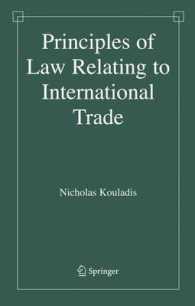- ホーム
- > 洋書
- > 英文書
- > Psychology
Full Description
Positive Autoethnography (PosAE) combines personal narrative and positive psychology to offer a new approach to self-reflective research. This methodology focuses on personal growth, resilience, and well-being, addressing the growing need for a more constructive, positive approach in fields like psychology and sociology. By emphasizing positive reflexivity, PosAE creates space for insights that uplift both writers and readers.
In Positive Autoethnography: An Introduction to Theory and Practice, authors Dr. Freda Gonot-Schoupinsky and Prof. Dr. mult. Claude-Hélène Mayer present the first comprehensive exploration of this methodology. Developed in consultation with Dr. Mark Weeks, and featuring the work of numerous scholars, this collection introduces the theoretical and practical underpinnings of PosAE. The authors reveal the close connection of PosAE to Pragmatic Autoethnography (PAE) and present its pragmatic usage across various applications. PosAE subtypes are showcased to highlight its therapeutic, intercultural, and collaborative potential, while addressing the unique needs PosAE fulfills within Positive Psychology (PP) and Autoethnography (AE). With practical examples and a broad interdisciplinary scope, this work underscores the adaptability of PosAE to a range of research contexts, making it accessible to scholars from diverse backgrounds.
Bringing a fresh perspective to qualitative research, Positive Autoethnography is a valuable resource for researchers, practitioners, and educators in PP, AE, psychology, social work, counseling, and beyond. Engaging in positive reflexivity, readers will find new ways to connect with autoethnographic practices that foster resilience, growth, and practical impact.
Contents
Foreword; Heewon Chang
Chapter 1. Introduction to Positive Autoethnography; Freda Gonot-Schoupinsky and Claude-Hélène Mayer
Chapter 2. Roots: The Journey to Contemporary Autoethnography; Freda Gonot-Schoupinsky
Chapter 3. History of Positive Psychology, Contemporary and Future Directions; Claude-Hélène Mayer
Chapter 4. The Theory of Positive Autoethnography and Some Insight into Pragmatic Autoethnography; Freda Gonot-Schoupinsky
Chapter 5. Intercultural Positive Autoethnography (IcPosAE); Claude-Hélène Mayer
Chapter 6. Positive Autoethnographic Case Studies; Freda Gonot-Schoupinsky
Chapter 7. Therapeutic Positive Autoethnography (ThePosAE); Claude-Hélène Mayer
Chapter 8. Rocked Me Like a Hurricane! A Positive Autoethnography by Bruce Friesen; Bruce Friesen, Claude-Hélène Mayer, and Freda Gonot-Schoupinsky
Chapter 9. Supporting Earthquake Survivors with the Laughie: A Positive Collaborative Autoethnography from Türkiye; Gülcan Garip, Nilgün Kuru Alici, Besime Alpdoğan, Claude-Hélène Mayer, and Freda Gonot-Schoupinsky
Chapter 10. Reflections on the Art and Practice of Joy: A Positive Collaborative Autoethnography; Ros Ben-Moshe, Joe Hoare, Claude-Hélène Mayer, and Freda Gonot-Schoupinsky
Chapter 11. A Promising Partnership: Positive Psychology and Positive Autoethnography; Grant Rich, Claude-Hélène Mayer, and Freda Gonot-Schoupinsky
Chapter 12. Horizons: Observations on the Role and Future of Positive Autoethnography; Freda Gonot-Schoupinsky and Claude-Hélène Mayer






